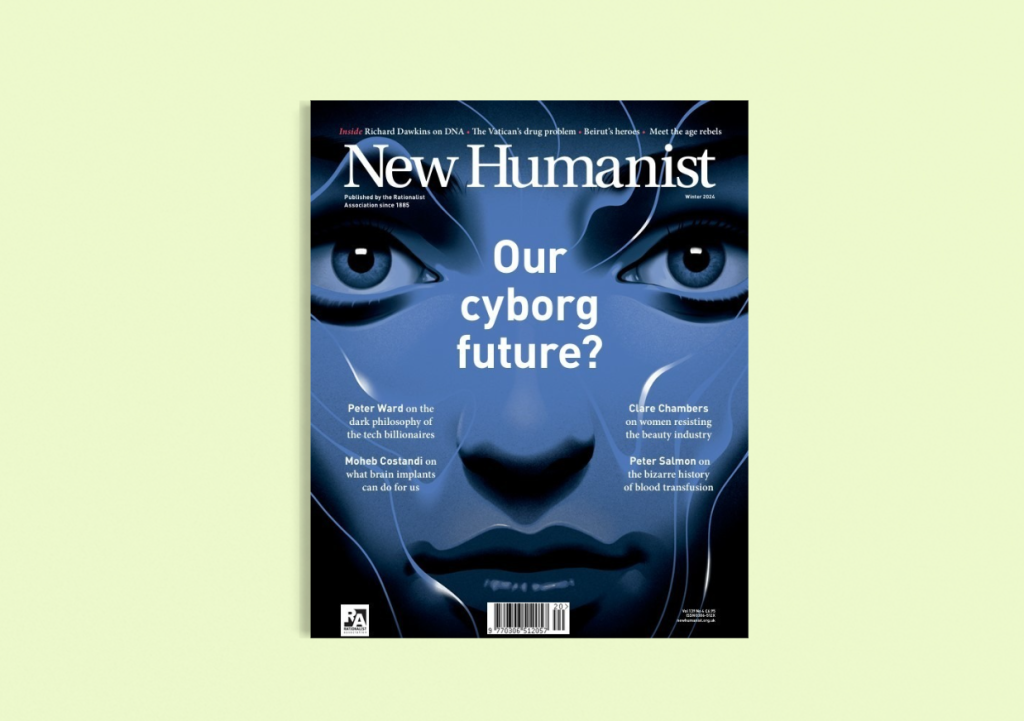In its winter issue, New Humanist examines the questionable ideologies of wealthy tech-industry patrons. While organizations like Elon Musk’s Neuralink are developing products that could potentially revolutionize healthcare, innovation is outpacing regulation, raising serious ethical questions.

Gatekeepers of wellbeing
Journalist Peter Ward delves into the rising popularity of effective altruism and longtermism – gatekeeping ideologies, which have become guiding principles for some of the world’s most powerful companies. Ward asks whether the radical ideas of these movements represent a threat to society.
Effective altruism, while purporting to save lives in developing countries through large donations to charitable organizations, ‘ignores the many complexities of aid’, writes Ward, ‘skimming over unintended consequences’ and ignoring quality of life. The fraud and money-laundering case against crypto billionaire Sam Bankman-Fried, who strategically shared his wealth, damaged the reputation of effective altruism, writes Ward. And yet, despite such demonstrations of its ethical limitations, the philosophy has already taken firm root in university campuses and globally influential businesses.
Longtermism, meanwhile, which aims to protect future generations, has effectively been hijacked by tech giants like OpenAI and Anthropic, who ‘believe the key to ensuring the safe evolution of … technology is – conveniently – that they undertake the development themselves’, writes Ward.
His critique continues: the ideology’s single-minded focus exposes it to accusations of ignoring present concerns such as poverty and climate change; the longtermism community’s links to the transhumanist movement, which promotes the modification of humans with technology, and its ‘obsession with IQ and intelligence’ hint at eugenicist beliefs; and its mega-rich philanthropists with outsized political influence threaten to undermine the democratic process.
Tech on the brain
Ethical concerns also lie at the heart of science writer Moheb Costandi’s research into the cyborg. In contextualizing the growing use of Brain-computer interfaces (BCIs), Costandi recognizes that the implantable chips are dramatically improving the lives of people with spinal cord injuries or neurological disease by facilitating communication and partial rehabilitation. The devices could also be used in the treatment of a whole range of neurological conditions, from epilepsy to depression and possibly even Alzheimer’s disease. But these applications are still at early stages of development and results are mixed.
Meanwhile, ‘wearable BCIs, which don’t require a surgical procedure, are increasingly available on the market, often with ambitious claims and little regulation’, writes Costandi. Elon Musk’s Neuralink, which in just eight years has become one of the leaders in the field, has set its sights on creating BCIs for healthy people. Musk’s ambition is to develop commercialized devices that can be used by millions to enhance the power of the human brain and boost physical abilities.
While much of this technological progress should be welcomed, Costandi cautions that there is a crucial difference between assisting those with disabilities and augmenting the capabilities of healthy people. ‘While the field progresses in leaps and bounds,’ writes Costandi, ‘there are questions about how the research is being conducted’.
Concerns abound over participant selection, privacy and personal data security, as well as the social disruption that could result from a person’s feeling of control over their behaviour, or perhaps even their sense of identity, being changed. ‘While BCIs have revolutionary potential’, writes Costandi, ‘strict regulation and proper data governance are urgently needed to ensure that the technology is used safely and equitably’.
Vein men
Elsewhere in the issue, Peter Salmon explores the ongoing obsession with blood transfusions as a way of extending human life or halting the ageing process. The New Humanist regular documents the history of blood transfusion, from the first experiments in the seventeenth century to the first human-to-human transfusion in 1818 and Soviet scientist Alexander Bogdanov’s ill-fated experiments with ‘young blood’ in 1928.
Bogdanov, who died of a hemolytic transfusion reaction, was a believer in Cosmism, a socialist utopian philosophy which saw it as mankind’s ethical duty not only to cure the sick but also to conquer death. The socialist’s ideas have seen a resurgence in popularity among billionaires who embrace transhumanism, embodied by the likes of tech mogul Bryan Johnson and the start-up company Ambrosia, which offers ‘young blood transfusions’ at a price only the super-rich can afford.
Yet Salmon echoes Ward’s concerns about transhumanism. Today’s tech billionaires and longevity proponents ignore altruistic concerns in favour of a capitalist model of innovation, separating the rich from the poor. ‘While benefits for humankind are touted,’ Salmon warns, ‘it is generally an extreme form of individualism that is front and centre’.
Review by Alastair Gill







